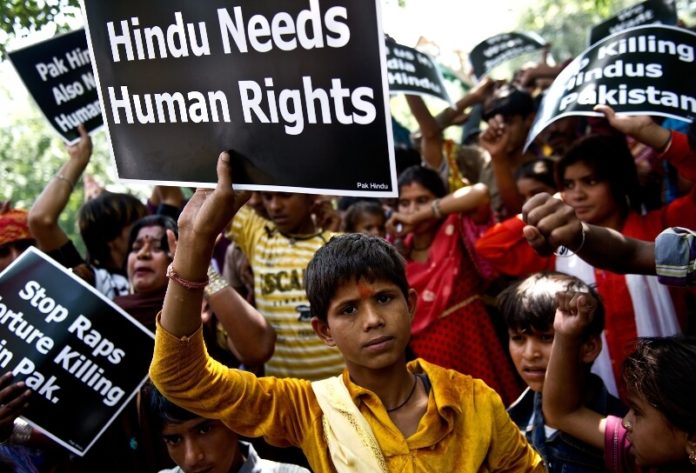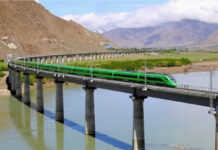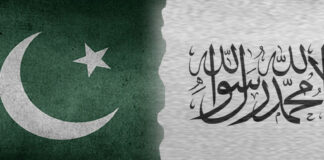Have we disowned the Hindus of Pakistan?
By Prashanth Vaidyaraj
“The persecution of Hindus in Pakistan is very much entrenched in the very foundations of the Islamic republic. The debates in Pakistan’s Constituent Assembly during the 1950s, prior to the finalizing of the country’s first Constitution of 1956, focused a great deal on the demand by the Islamists in the Assembly to pronounce Pakistan an Islamic state. There were ulema (Islamic scholars or clerics) both within and outside the government who championed this demand.”
Dewan Sateesh Kumar was a normal teenager in Sindh province of Pakistan. A lively boy, he was very active among his peer groups and used to enjoy his outings with his friends. On one such outing in July last year, he was simply shot dead by Islamists. No questions asked, no trials and without anyone raising a finger. His crime? He simply happened to be at the wrong place at the wrong time where the Holy book Quran was purportedly desecrated. However, there was no proof found of any desecration more so of Sateesh doing it. Avinash, his friend who was with him was also shot and is in a critical condition.
Right to express is an alien concept in Islamic countries. But in Pakistan, even right to live seems a luxury for the minorities, especially the Hindus.The killing of Sateesh was just one among the hundreds of Hindus killed or targeted by the establishment itself for similar reasons every year in Pakistan. Amar Lal, a medical store owner in Ghotki area of Sindh was arrested in June 2016 over blasphemy charges after massive protests by Muslims of the area. The newspaper which reported the incident, The Dawn, also noted that no one in the area or the authorities themselves were sure of the crime he committed. A mere hearsay must have enraged the Muslims against Amar Lal who is also said to be suffering from a psychotic disorder. Such was the frenzy created over the incident by the mullahs of the region, that all shops and establishments belonging to the Hindus in the area was shut for the fear of attacks on them. Likewise, another young Hindu boy, Nitish Kumar was shot dead in the same month in Sindh over alleged blasphemy charges. On June 12, an elderly Hindu man was beaten by a policeman in Pakistan’s province of Sindh for allegedly eating during the holy Islamic month of Ramadan. Later, the victim was reportedly forced to reconcile and resolve the issue out of court. The nature of the spate of hate killings and targeting of Hindus in Pakistan only point to one agenda – obliterate the Hindus in the country by any means available.
It’s now an old fact that the population of the Hindus in Pakistan had come down from 24% during 1947 to less than 1.5% in the 2000s. Their population has declined by about 90 per cent in about 50 years. This decimation is the outcome of sustained legal and social discrimination ever since the creation of Pakistan. The theocratic state of Pakistan has institutionalized discrimination of non-Muslims in its constitution and laws. The minority Hindus have almost no safeguard from the state or cannot even opt for legal recourse in cases related to blasphemy or desecration. Along with Hindus, the Ahmadis who have been declared non-Muslim by the writ of the state, and other non-Muslim minorities such as Christians and Sikhs have been the targets of suicide bomb attacks on their neighborhoods, had community members converted to Islam against their will, and had their houses of worship attacked and bombed even while they were inhabited by worshipers. In Sindh and Balochistan provinces, well-to-do Hindus have been the primary targets of the ransom kidnappings. Those accused of “blasphemy” have sometimes been burnt alive outside police stations with no culprits identified or punished. In 2014, Dr Ramesh Kumar Vankwani, a Hindu lawmaker and A member of the ruling Pakistan Muslim League-Nawaz (PML-N) told the National Assembly that every year about 5,000 Hindus flee Pakistan to avoid persecution. There have been consistent reports of forced conversions of Hindu girls to Islam. A madrasa (religious school) in Sindh, called Dargah Alia QadriaBharchundi Sharif, has openly made claims about its aim of converting at least 2,000 Hindu girls to Islam.
Hate at the foundation of Pakistan
The persecution of Hindus in Pakistan is very much entrenched in the very foundations of the Islamic republic. The debates in Pakistan’s Constituent Assembly during the 1950s, prior to the finalizing of the country’s first Constitution of 1956, focused a great deal on the demand by the Islamists in the Assembly to pronounce Pakistan an Islamic state. There were ulema (Islamic scholars or clerics) both within and outside the government who championed this demand. Within the government, the clamor for an Islamic state was led by MaulanaShabbir Ahmad Usmani, President of the JamiatUlema Islam (JUI) and pir of Manki Sharif from the North West Frontier Province (now Khyber Pakhtunkhwa), and MaulanaAkram Khan, President of the East Pakistan Provincial Muslim League.
The blueprint and arguments for the steps required to transform Pakistan into an Islamic State came from Abul Ala Maududi, founder of the Jamaat-e-Islami (JI), the South Asian analogue of the Arab Muslim Brotherhood. According to Maududi, the future constitution of Pakistan had to be based on the underlying assumption that sovereignty rested with Allah and that the state’s function was solely to administer the country. According to him, Sharia was the law of the land and no man-made law could contravene the Sharia.
The extent of Maududi’s influence became visible as early as 1949, when the Objectives Resolution, defining the foundational principle for Pakistan’s Constitution was passed by the Constituent Assembly. The resolution stated,
- Sovereignty belongs to Allah alone but He has delegated it to the State of Pakistan through its people for being exercised within the limits prescribed by Him as a sacred trust.
- The State shall exercise its powers and authority through the chosen representatives of the people.
- The principles of democracy, freedom, equality, tolerance and social justice, as enunciated by Islam, shall be fully observed.
- Muslims shall be enabled to order their lives in the individual and collective spheres in accordance with the teachings of Islam as set out in the Quran and Sunnah.
- Adequate provision shall be made for the minorities to freely profess and practice their religions and develop their cultures.
- Pakistan shall be a federation.
- Fundamental rights shall be guaranteed.
- The judiciary shall be independent.
Non-Muslim politicians objected to the notion of making state policy subservient to “the teachings and requirements of Islam,” which they rightly pointed out were subject to debate and variation. Bhupendra Kumar Dutta, a Hindu politician from East Bengal, warned that the resolution would lead to discrimination against non-Muslims and to internecine battles among Muslims. Politics, Dutta argued, “comes within the sphere of reason while religion within that of faith. If religion and politics are intermingled then there is a risk of subjecting religion to criticism, which will rightly be presented as sacrilegious and it would also cripple reason and curb criticism as far as the state policies are concerned.
”In response to objections, Liaquat Ali Khan, the mover of the resolution and Prime Minister, stated that “Pakistan was founded because Muslims of this subcontinent wanted to build up their lives in accordance with the teachings and traditions of Islam.” The Prime Minister, a secular individual, described the passing of the resolution, “as the most important occasion in the life of this country, next in importance only to the achievement of independence.”
Once Pakistan’s raison d’être had been defined in religious terms, the Islamist demands could not be held at bay. Maududi and his fellow Islamists said that citizenship in an Islamic state was open to any Muslim, born anywhere in the world, even if he was not born in the country. However, non-Muslims had to enter into a covenant with the Islamic state.From Maududi’s point of view, Non-Muslim culture had a negative impact on Muslim life. “It destroys its inner vitality, blurs its vision, befogs its critical faculties, breeds inferiority complexes, and gradually but assuredly saps all the springs of culture and sounds its death-knell,” he wrote. According to him, “the Holy Prophet has positively and forcefully forbidden the Muslims to assume the culture and mode of life of the non-Muslims.”
Over the years, the Islamist rejection of “non-Muslim” culture took the form of attempts to define a limited “Muslim” culture and limiting the freedom of non-Muslims and Muslims alike to embrace diversity. While non-Muslims were easily defined as “the other,” a struggle also started to determine who among Muslims were pure and who had allowed Persian or Indian culture and practices to taint their faith.
Pakistan’s non-Muslim minorities, particularly Sikhs and Hindus, were “cleansed” during the partition riots at the time of independence. Attacks against other minorities too started as early as the 1950s when anti-Ahmadi demonstrations and riots took place. They culminated in the 1974 amendment of Pakistan’s Constitution according to which Ahmadis were no longer to be treated as Muslims. The rise of contemporary sectarianism, however, dates back to the 1980s.
Top-Down Islamization
According to Muhammad Qasim Zaman, sectarianism in Pakistan started out as an “urban phenomenon.” However, over the years it has transformed into much more than that. A combination of socio-economic factors, state-led Islamization and international events (like the Islamic Revolution in Iran) have played their role in the rise of Shia-Sunni tensions. However, during all these intra-Islam struggles in Pakistan, the Hindus bore the brunt of the Islamists anger who were each trying to prove their ‘purity’ over the other sect.
General Zia ulHaq, Pakistan’s third military ruler who ruled from 1977-88, imposed a policy of state-led Islamization. Till the time of Zia, most Islamists believed, like Maududi, that given the opportunity any good Muslim would vote an Islamist party into power and set up an Islamic state. By the 1970s it was evident that given the choice Pakistanis, like others, voted for political parties which promised them roti, kapra, makan (food, clothing, and housing). This led to what Vali Nasr refers to as the phenomenon of “top-down Islamization” in countries like Malaysia and Pakistan.
As part of this Islamization process General Zia brought in rules and regulations which were supposed to bring Pakistani law more into tune with the Sharia, or at least the Sharia as interpreted by him and his cohorts. These laws, which included the infamous blasphemy law, had a long-term impact on Pakistan’s minorities.
The militants who attack Hindus and other minorities roam with impunity, appear on prime-time talk shows on television and hold political rallies where they declare minorities as unbelievers and Wajib-ul-Qatal (deserving of death). These groups have ties to political parties that afford them both political influence and protection. They are rarely arrested, even after they proudly and publicly announce their deeds—like in the repeated massacres in 2013 of Hazara Shias in Quetta. When they are arrested, these terrorists have access to mobile phones in prison, receive visitors openly and are often released swiftly on their own recognizance. The few who have been tried have always been acquitted by Pakistan’s judiciary on the grounds of “lack of evidence.”
The anti-Soviet Afghan jihad of the 1980s not only helped the groups in Afghanistan, it had a massive blowback on Pakistan. Money from Saudi Arabia and other Gulf countries poured in for madrassas all over Pakistan, bringing curricular changes, a Wahhabi (or as it is referred to in South Asia, Ahl-e-Hadith) version of Islam and its views of both Muslim as well as non-Muslim minorities.The curricular changes were not only in the religious schools but also the secular ones. An entire generation of Pakistanis studying in public (and secular) schools has grown up viewing not only non-Muslim minorities like the Hindus but also Muslim minorities as “the other,” as “unpatriotic,” and as “not Muslim enough.” Such blatant bias has openly fostered intolerance of the community. The curriculum of several subjects taught in public schools, including Urdu, history, and Islamic studies, is also filled with prejudice and hate-mongering against Hindus. A study analyzing the country’s textbooks from grade 1-10 concluded that “Hindus are repeatedly described as extremists and eternal enemies of Islam whose culture and society is based on injustice and cruelty, while Islam delivers a message of peace and brotherhood, concepts portrayed as alien to the Hindu.”
There has been a steady decline in religious tolerance in Pakistan over the last 65 years. At the time of Pakistan’s birth and the partition of India in 1947, non-Muslim minorities comprised twenty-five percent of the new country’s population, whereas today they only comprise five percent. According to the last census in Pakistan which collected such data, conducted in 1998, Christians constitute 1.59 percent and Hindus 1.60 percent of Pakistan’s population. While much of the “cleansing of the population” took place in major events (partition, around the 1965 and 1971 wars), there has also been a steady rise in incidents involving attacks on both Christians and Hindus in the last decade.
Will Hindus of Pakistan Survive?
The rising radicalization of Pakistani society reflects willful disregard for the rights of its minority populations and also unwillingness among many politicians and bureaucrats to confront the Islamist extremists. The policy of Pakistan’s security services to use religious extremists in regional battlegrounds such as Kashmir and Afghanistan also contributes to their impunity. Hindus in Pakistan are generally seen as agents of the Indian security agencies and are seen as Indians. Pakistani lawmakers’ criticism and condemnation of India often turns into condemnation of all Hindus in Pakistan. According to a Hindu activist, acts of violence against the Hindu community in Pakistan are always justified in retaliation for alleged Indian atrocities in Kashmir and other violence against Muslims, including the 2002 Gujarat riots.
The small and ever-decreasing Hindu minority has faced a steady barrage of forced conversions and kidnappings, often for ransom. In the last few years there has been an increase in the number of Hindu families migrating or seeking asylum in neighboring India.
One incident of forced conversion of a young Hindu woman that garnered a lot of media coverage was that of RinkelKumari. She was abducted with the help of a ruling-party lawmaker and forced to marry and convert to Islam. This is just one case of abduction and forced religious conversion in Pakistan, with around 20-25 kidnappings and forced conversions of Hindu girls in Sindh every month according to a report by the Asian Human Rights Watch.
Discriminatory laws implemented during the 1980s and violence against religious minorities continues to remain of serious concern.Pakistan’s infamous “Blasphemy Law” has targeted religious minorities on a regular basis. During the British era, blasphemy laws were used infrequently and were reserved for prosecution of clerics, authors and preachers who caused inter-communal violence by attacking other faiths. But since 1982, any individual can be charged with blasphemy, leading to vigilantism and frivolous accusations against Pakistan’s minorities, especially Hindus.
Role of the Indian Government
The consequent Indian governments have not gone beyond ‘expressing anguish’ and provisioning citizenship for few of those who migrated to India. The present dispensation under Narendra Modi has hastened the process of granting citizenship to Hindus who have crossed over to India to escape persecution in Pakistan.In a written reply to a media organization, the Indian government has revealed that more than 1,400 Pakistanis have been given citizenship since 2011 and that an overwhelming majority of them are Hindus.Those living in the Delhi camps, however, say they are yet to get Indian citizenship.
“We applied in 2011 but nothing has happened. The BJP government which claims to have sympathy for us is no different from other governments. We feel frustrated,” says Arjun Das, who is regarded as the leader of Pakistani Hindus in Delhi camps. Several in the camps have complained that no ‘Hindu leader’ has come forward to talk to them or address their issues.
The Indian governments should go beyond condemning Pakistan and expose its treatment of minorities, especially Hindus on the world stage. Impressing the UN and other western nations to impose sanctions on Pakistan for persecution of minorities should be part of the agenda to safeguard Hindus there. India should also demand Pakistan for equal rights for Hindus in education, employment and state benefits. There are several International laws and treaties that have codified minority rights which cover protection of existence, protection from discrimination and persecution, protection and promotion of identity, and participation in political life. These include the International Covenant on Civil and Political Rights (Article 27), the United Nations Declaration on the Rights of Persons Belonging to National or Ethnic, Religious and Linguistic Minorities, two Council of Europe treaties (the Framework Convention for the Protection of National Minorities and the European Charter for Regional or Minority Languages), and the Organization for Security and Co-operation in Europe (OSCE) Copenhagen Document of 1990. Pakistan is a member of the UN and a signatory to many treaties above and is bound to adhere to the International laws that guarantee minority rights.
There is no other country in the world that can be concerned about the rights of Hindus other than India. Culturally and in civilizational ethos, India is the only country that is bound to safeguard Hindus the world over. No international NGO will truly care about the plight of Hindus in Pakistan as it doesn’t fit their agenda. No organization of Hindus or related NGOs in India commands enough clout at the international level, to raise the plight of Hindus in Pakistan and demand action. Given its raising economic and military clout, it is only prudent for the India government to ensure that Hindus the world over areable to exercise their rights without fear. Immigrating to India and seeking citizenship is not the just solution to the plight of Hindus in Pakistan. This will only embolden the forces who want that to happen. Instead the focus should be to guarantee the Hindus there to freely practice their faith and ensure equitable rights in education, employment and state benefits. If India does not take up the responsibility of Hindus in Pakistan, no one will.








